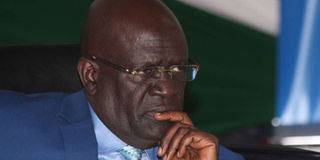Magoha seeks advice on study years under new curriculum

Education Cabinet Secretary George Magoha during the launch of the National Curriculum Policy at the Kenya Institute of Curriculum Development in Nairobi on May 15, 2019. PHOTO | KANYIRI WAHITO | NATION MEDIA GROUP
What you need to know:
This comes after training on the new competency-based curriculum, following the rollout of the 2-6-3-3-3 system to replace the 8-4-4 system.
There was a proposal to increase the number of years one spends in primary school to nine and reduce the number of secondary school years to three.
However, Prof Magoha noted on Wednesday that he will not allow learners to spend more years in primary school.
Education Cabinet Secretary George Magoha has formed a taskforce to advise him on the number of years learners will spend in primary and secondary school under the new curriculum.
This comes after training on the new competency-based curriculum, following the rollout of the 2-6-3-3-3 system to replace the 8-4-4 system.
The first two years are for lower primary education, six for upper primary, three for lower secondary, another three for upper secondary and three more for tertiary education.
But there was a proposal to increase the number of years one spends in primary school to nine and reduce the number of secondary school years to three.
Under this proposal, junior secondary grades - 7 to 9 - would be under the primary section, with learners in these grades (the current Form One) being taught by primary school teachers.
This would leave the secondary section with only Grade 10, 11 and 12.
CONSULTATIONS
However, Prof Magoha noted on Wednesday that he will not allow learners to spend more years in primary school.
“We are still engaging [parties] on where to place Grade 7, 8 and 9,” he said.
Prof Magoha said any decision that will be made will be in the interest of learners.
He spoke at the Kenya Institute of Curriculum Development (KICD) in Nairobi, where he launched the National Curriculum Policy.
MORE CLASSES
Prof Magoha further said the government will ready itself to reduce capitation to universities in order to fund construction of two additional classes to cater for students in lower secondary.
“The government has not said it has no money to keep students in secondary schools,” he said.
Budget estimates presented in Parliament by Treasury Cabinet Secretary Henry Rotich indicate that starting July, schools will get Sh1.5 billion for infrastructure development while Sh2.4 will be for the new curriculum and the digital literacy programme.





